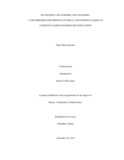
Please use this identifier to cite or link to this item:
https://hdl.handle.net/20.500.14301/357| Title: | My Journey of Learning and Teaching: A Trans/formation from Culturally Decontextualised to Contextualised Mathematics Education |
| Authors: | Shrestha, Indra Mani |
| Citation: | Shrestha,I.M.(2011).My Journey of Learning and Teaching: A trans/formation from culturally decontextualised to contextualised mathematics education. |
| Issue Date: | Dec-2011 |
| Publisher: | Kathmandu University School of Education |
| School: | SOED |
| Department: | DOSE |
| Level: | Masters |
| Program: | Master of Education in Mathematics Education |
| Abstract: | This dissertation portrays my comprehensive and evolving inquiry into the prolonged problems of culturally decontextualised mathematics education encountered by the students of Nepal in schools and colleges. It also depicts how the pupils from the land of diverse cultures are deprived of learning contextualised (culturally embedded) mathematics. I have presented comprehensively my learning practice of mathematics in school, colleges and University, teaching practice of mathematics in secondary school and trainings I have given to primary school teachers based upon the Habermas’ three fundamental human interests-technical (controlling), practical (understanding) and emancipatory (independence). To portray my research study, I have chosen an autoethnography, small p philosophical inquiry and Living Educational Theory as my methodological referents comprising narratives such as poems, drama, dialogues and stories visualizing them with interconnected photographs so far. Autoethnography helped me produce the research texts of my cultural and professional contexts of learning and teaching mathematics. ii Small p philosophical inquiry enabled me to generate new knowledge via a host of innovative epistemologies that have the goal of deepening understanding of normal educational practices by examining them critically, identifying underpinning assumptions, and reconstructing them through scholarly interpretations and envisioning. And living educational theory enabled me to inquire lived and living contradictions of our lifeworlds. In order to carry out my ontological (what is reality?) and epistemological (to know reality) activities I have used the paradigms of interpretivism (Habermasian practical interest) and criticalism (Habermasian emancipatory interest). The paradigm of interpretivism helped me in interpreting/explaining the teaching-learning practice of culturally decontextualised mathematics embedded in events or situations of my life. The critical paradigm helped me to identify my research problem, to critically reflect upon my teaching-learning experiences and to transform my teaching/learning from culturally decontextualised to contextualised mathematics education. I also depicted how inclusion of ethnomathematics in academic mathematics helps pupils in understanding (practical) the culturally decontextualised (pure?) mathematics in sharing of knowledge through co-operative learning in an independent environment (emancipatory) rather than in controlled environment (technical). I also portrayed how an inclusion of contextual mathematics in Nepali curriculum prevents pupils from diversion/rejection of academic mathematics as a body of pure knowledge. |
| URI: | https://hdl.handle.net/20.500.14301/357 |
| Appears in Collections: | Dissertation |
Files in This Item:
| File | Description | Size | Format | |
|---|---|---|---|---|
| MEd Thesis [Indra Mani Shrestha].pdf | 2.45 MB | Adobe PDF |  View/Open |
Items in DSpace are protected by copyright, with all rights reserved, unless otherwise indicated.